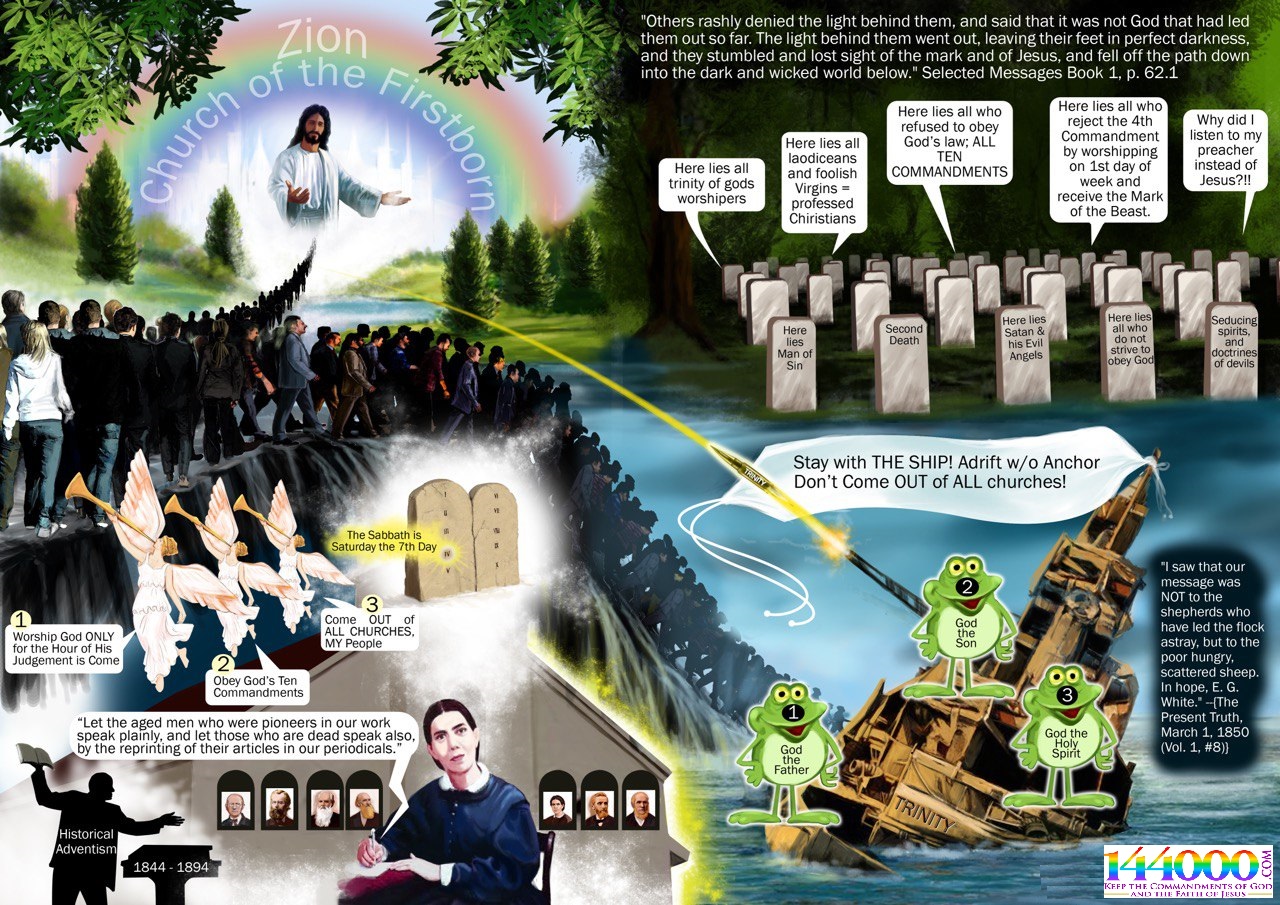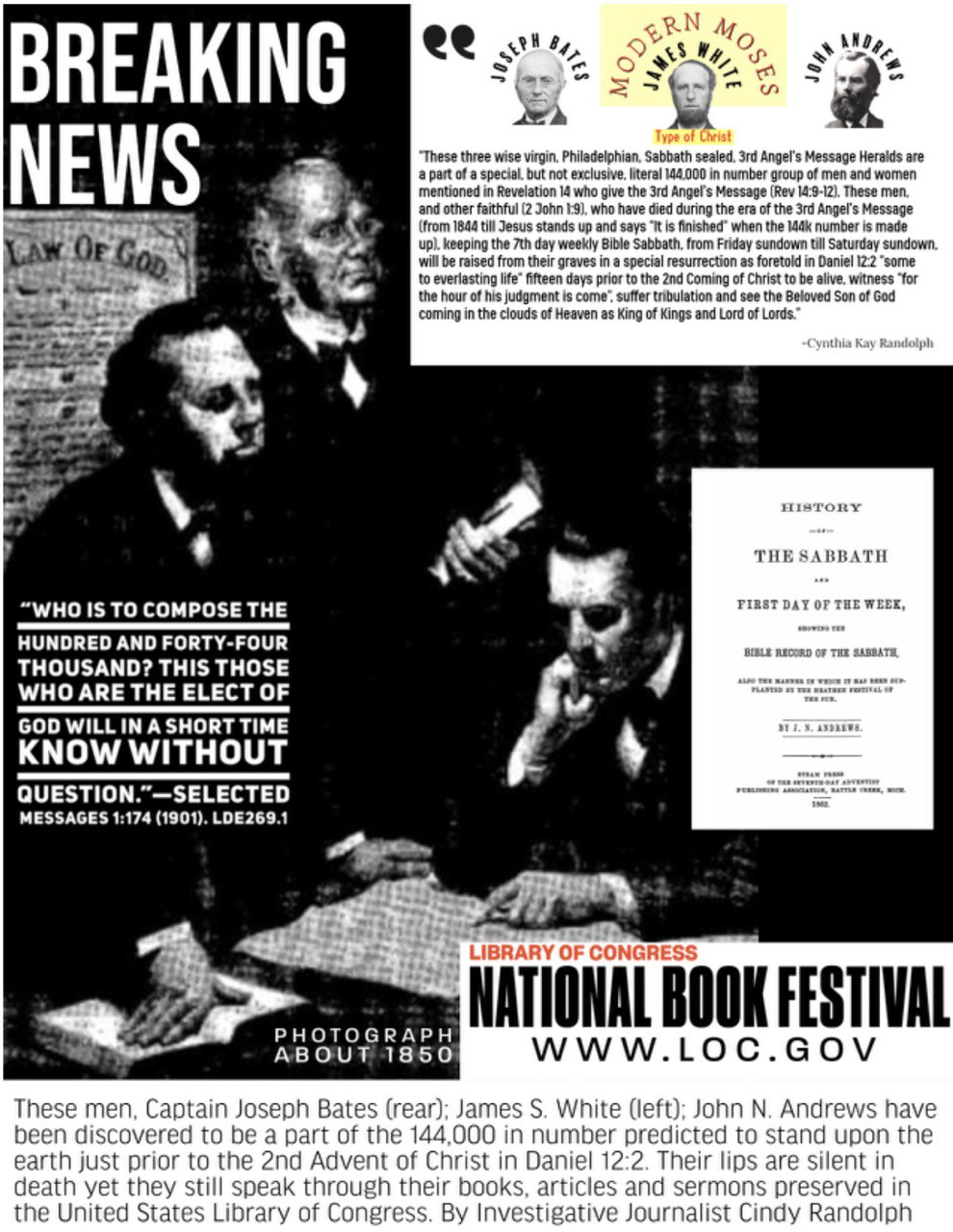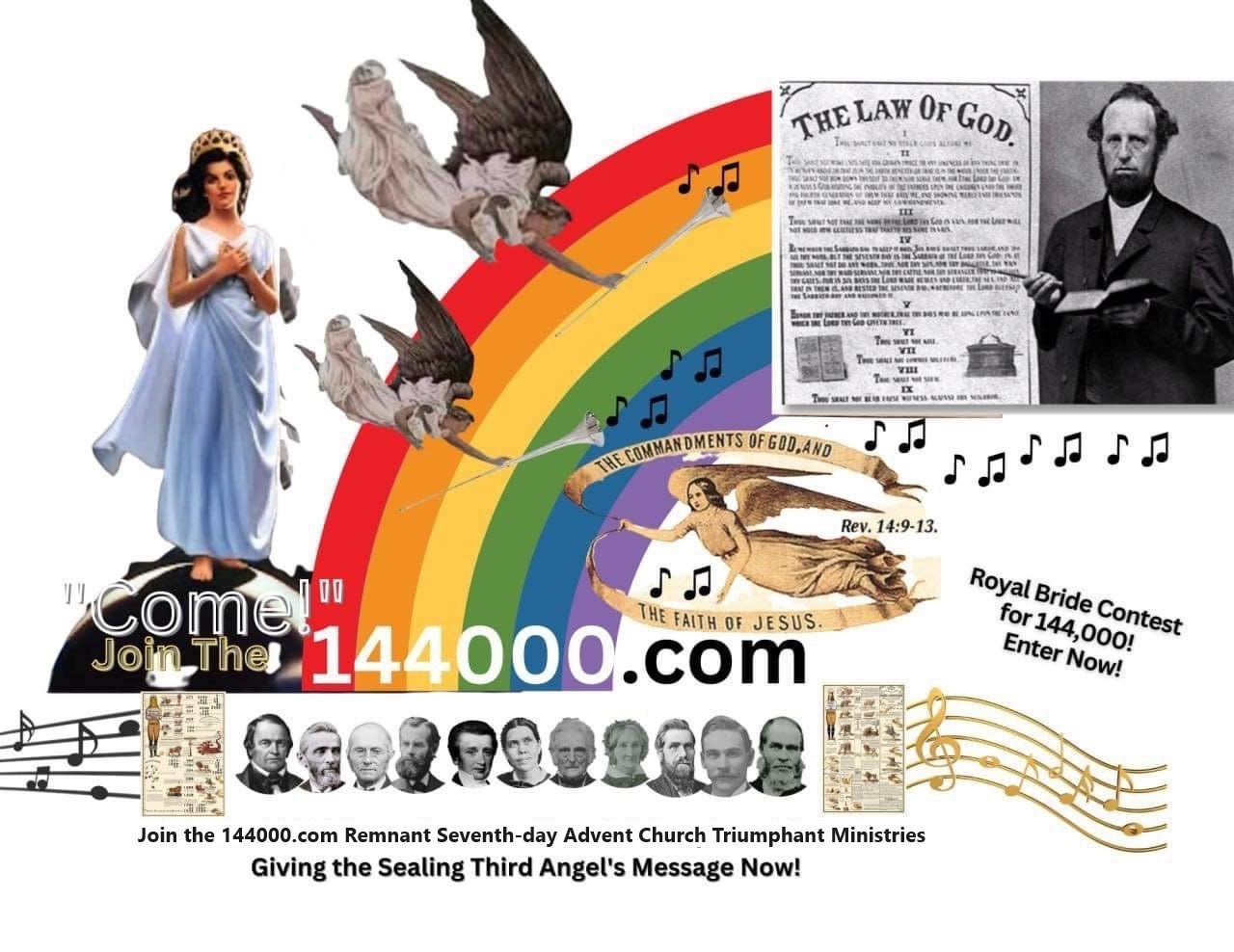
'History of the Sabbath and First Day of the Week' By John Nevins Andrews (1829-1883) in PDF Format Now
The Trinity Explained
Discover the Origin and the Family Tree Geneology of the Trinity of Gods below:
1 Timothy 1:17 (KJV):
"Now unto the King eternal, immortal, invisible, the only wise God, be honour and glory for ever and ever. Amen."
Babylons Crowning Sin Was That Of Imputing All Her Wisdom And Power Unto False Gods
Stephen Haskell, Seer of Patmos, Chapter 14.
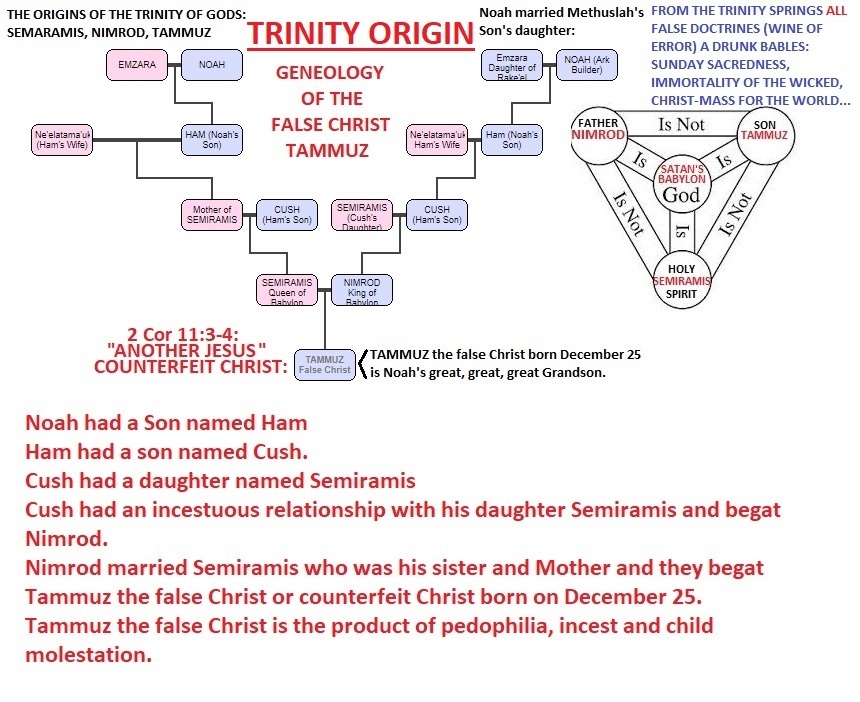
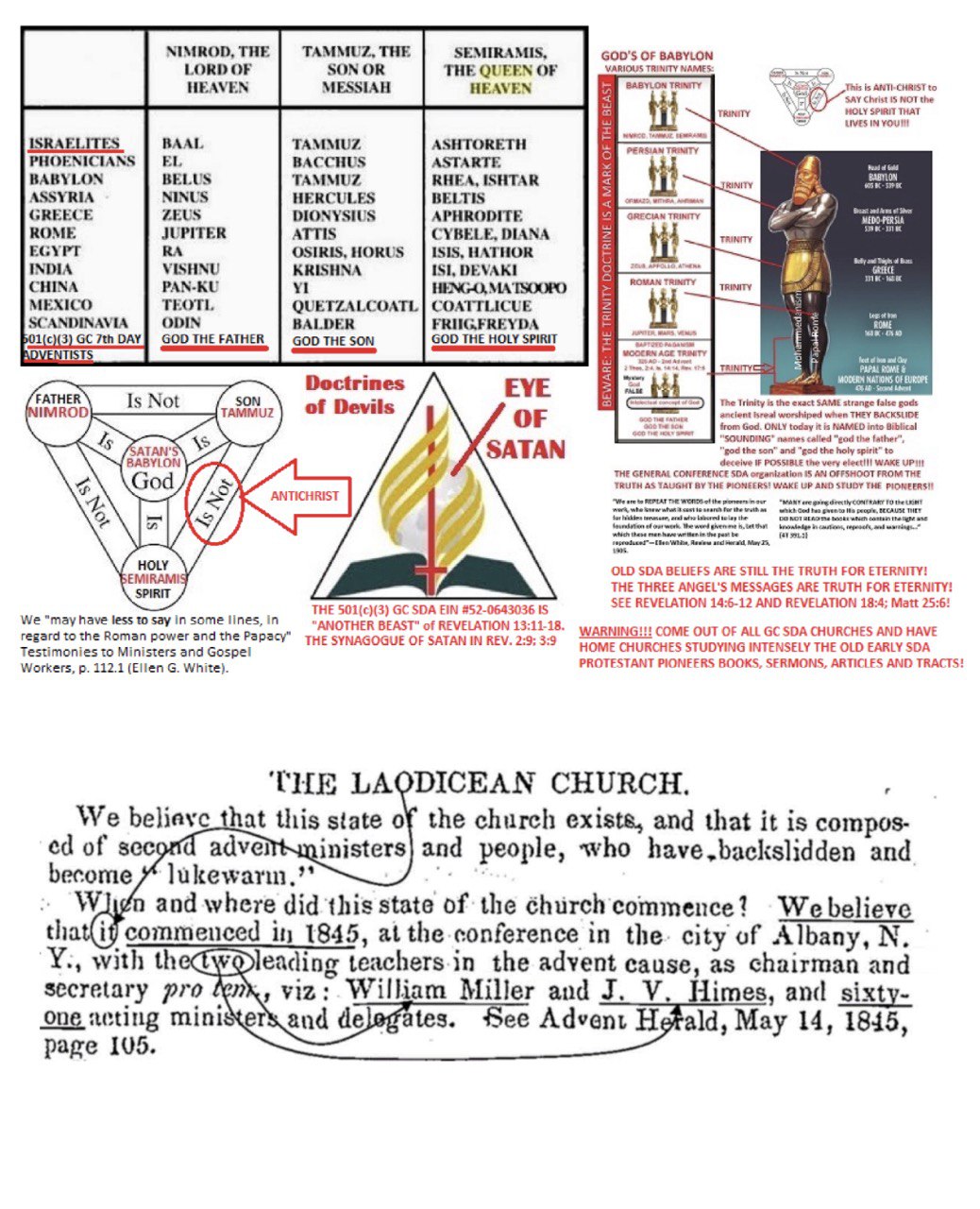
“The third angel is now raising his voice in the message. Those who reject it, reject the counsel of God against themselves. They are now being tested. The third angel’s message will be understood. It is now to be seen who will receive it, and who will reject it. Those who reject the present truth must receive the mark of the beast; for in rejecting the truth they reject the Spirit’s teaching.
— James White, The Present Truth, Vol. 1, No. 1, August 1849, p. 2The third angel’s message was, and still is, a WARNING to the saints to ‘hold fast,’ and not go back, and ‘receive’ THE MARKS which the virgin band got rid of, during the second angel’s cry.
— James White, A Word to the Little Flock, April 21, 1847, p. 11The greatest fault we can find with the Reformation is, the Reformers stopped reforming. Had they gone on, and onward, till they had left the last vestige of Papacy behind—such as sprinkling for baptism, the Sunday for the Sabbath, and the Trinity, &c.—which are all of Papal origin, the church would now be free from her unscriptural errors.
— James White, The Present Truth, Vol. 1, No. 3, November 1850, p. 87
Biblical Truth vs. Trinity Doctrine: Uncovering the Controversial Origins and Scriptural Analysis of the Godhead
This page delves into the controversial doctrine of the Trinity, examining its biblical validity and historical origins. Did you know that Jesus was killed by the Jews in 31 AD for NOT believing in the Trinity? YES! Learn more here. This page explores why many of Christ's followers and some modern believers reject the concept of a triune God, instead advocating for the biblical view of the Godhead as two distinct beings—the Father and His Son, Jesus Christ. We analyze key Bible verses often cited in defense of the Trinity and provide counter arguments from a biblical perspective, discussing alternative interpretations such as Unitarianism, Arianism, and Binitarianism. Discover how the Council of Nicaea and the Athanasian Creed shaped this doctrine, and why it is a departure from the true teachings of the Bible. Whether you're seeking clarity or challenging long-held beliefs, this comprehensive study offers thought-provoking insights into one of Christianity's most debated doctrines.
The Rise of a Dark Legacy - The Post Noah's Flood New World Order - After Noah's Flood
- 1651 AM: Noah began building the ark.
"Therefore, Noah began to build the ark from the 1651st year to the 1656th year." (Genesis 6:3, Genesis 7:6) - 1656 AM: Noah completed the ark (Noah was 600).
"Noah was 600 years old when the floodwaters came upon the earth." (Genesis 7:6)
In a world reborn from the ruins of Noah's Great Flood, as humanity struggled to reclaim its place upon the earth, a now shadowy history of ambition and forbidden desire began to unfold and grow. The righteous Noah, who had steered his family to safety through the deluge, never imagined the darkness that would spring from his own bloodline. Among his three sons—Shem, Ham, and Japheth—it was Ham’s lineage that would give rise to a story both shocking and terrible, a story that would echo through the ages.
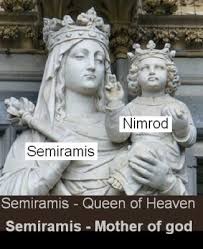
Ham’s son, Cush, was a man of unrelenting ambition, and a evil desire toward his daughter Semiramis, was sexually assaulted by her Father Cush. (Noah's grandson Cush by his son Ham). In a twist of fate that would forever stain their lineage, Cush defied the sacred bonds of family and sexually assaulted his own daughter Semiramis against God's commandments. From this criminal, incestuous, unnatural, unholy union, a child was born—Nimrod. Both son and grandson of Cush and great-grandson of Noah, born of incest and shrouded in sin, Nimrod was destined to become a figure of both legend and infamy.
As Nimrod grew, so did his hunger for power. He was not merely a hunter of beasts but of men’s hearts and souls. His strength and cunning made him a formidable leader, and soon, he rose to dominate the fledgling post-Noah's flood new world. His mother, Semiramis, saw in him not just a son, and a brother, and a husband, but also a king destined to rule over all. And so, in a blasphemous twist that defied the very order of nature, she became his wife, joining their fates in an unholy union that would forever alter the course of history.
"Nimrod, the mighty hunter before the Lord..." — Genesis 10:9
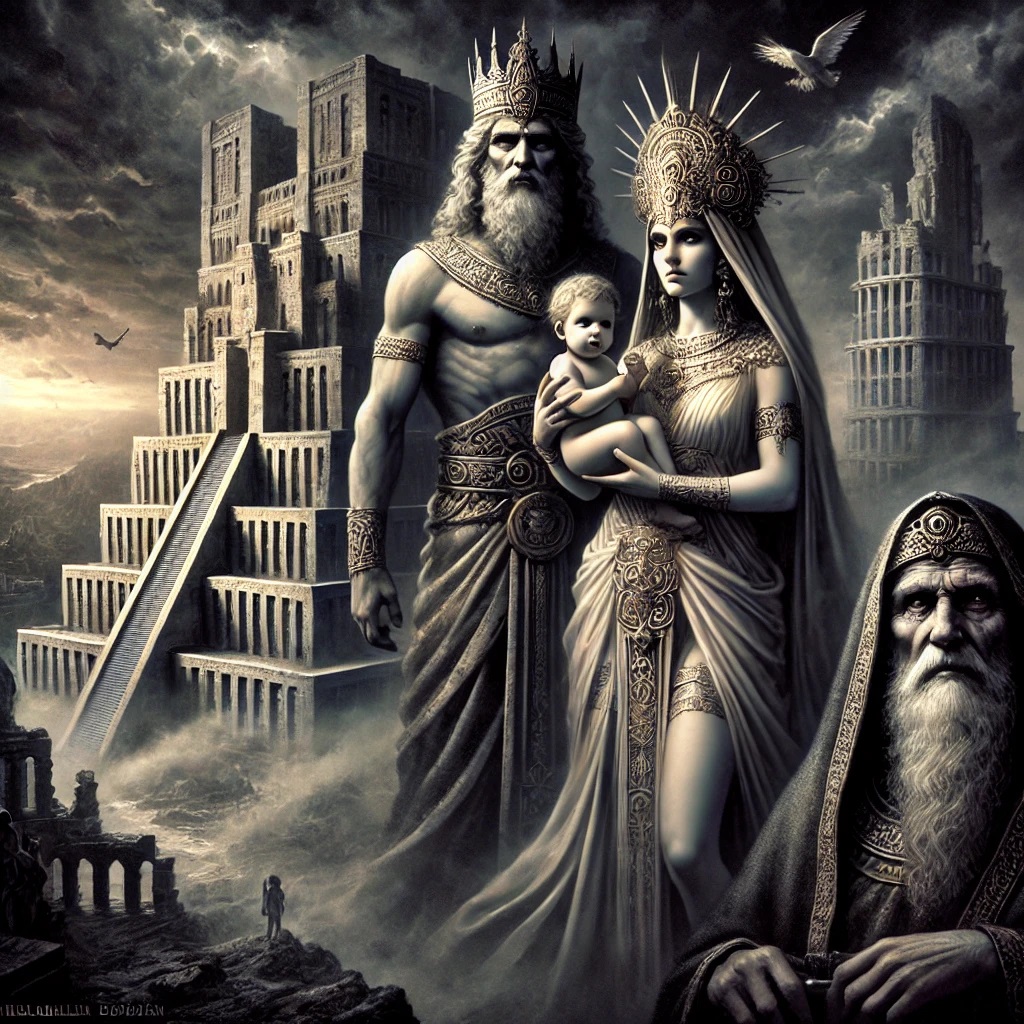
Nimrod’s reign grew ever more tyrannical. He was not just a king but a despot, a man who reveled in cruelty and conquest. His name became synonymous with evil, his deeds whispered in fear by those who suffered under his rule. But even death could not end his story.
Semiramis, ever the cunning sorceress, refused to let his legacy die. She claimed that Nimrod had ascended to the sun, becoming a god among gods. Declaring herself the "Queen of Heaven," also known as "GOD THE HOLY SPIRIT", she wove a history that would haunt the ages. A miraculous conception, she proclaimed, had occurred: a ray of sunlight, the very essence of Nimrod, had impregnated her, and thus she bore Nimrod again, reincarnated as another son—Tammuz.
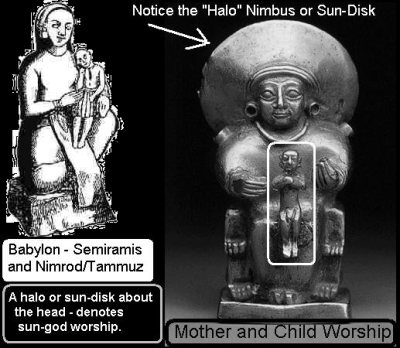
Tammuz, also known as "GOD THE SON" and "ANOTHER JESUS" (2 Cor 11:3-4), born of deceit and idolatry, was hailed as a divine savior, the reincarnation of Nimrod himself. His birth, celebrated on December 25, became the cornerstone of a new religion—a parody of the divine, a perverse imitation of the true promise. Today, the world unknowingly celebrates this day as Christmas, honoring the birth of a false messiah, blind to the dark origins of this history. Semiramis gave birth to her own grandson, Tammuz, who the world bows down and worships as "another Jesus" (1 Cor 11:3-4), on Christmas and in the Trinity as "God the Son". Tammuz was not born in Bethlehem.
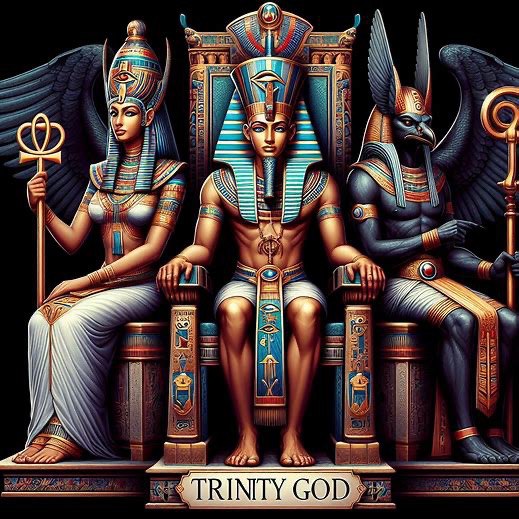
This heathen religion of Nimrod, Semiramis and Tammuz is the first "triad" or "trinity" of gods. The names of these gods have only been changed down through the years from country to country to Biblical "sounding" names today. The name of Semiramis has been changed to "God the Holy Spirit" and "Tammuz" has been changed to "God the Son" and "Nimrod" to "God the Father". This "trinity" of gods is worshiped by the majority of Christendom today.
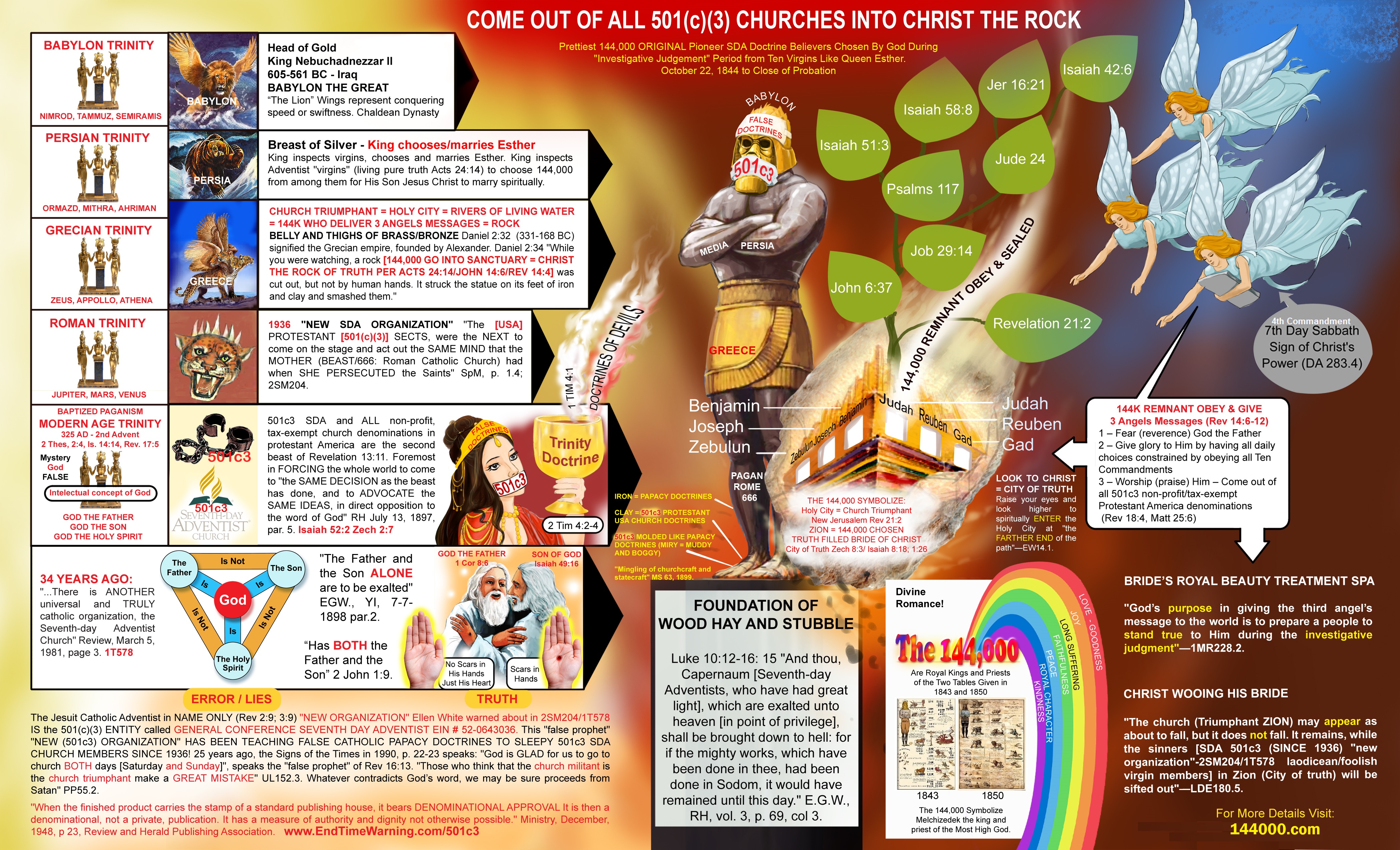
Nimrod, Semiramis, and Tammuz—together, they formed the first unholy trinity, a blasphemous reflection of the divine. Their story, one of incest, rebellion, and deception, has been etched into the annals of history, hidden in plain sight beneath the veils of myth and tradition.
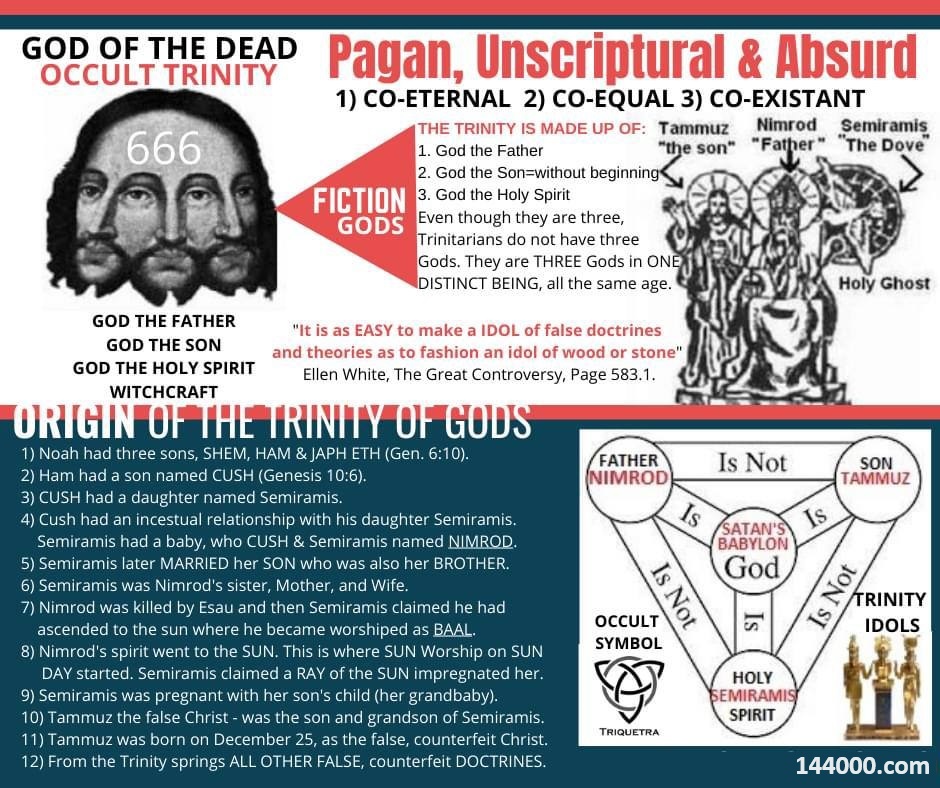
The Shadow of Babel: A Dark Legacy unravels the true history behind the Tower of Babel, revealing the story of a great-grandson Nimrod of Noah who defied the Almighty and forged an empire built on lies. It is a story of gods and men, of light and shadow, and of the first unholy trinity, whose dark tendrils reach from the past to ensnare the hearts of men even today.
For those brave enough to peer beyond the veil of history, to confront the shadowy legacy of the world’s first great empire, this is the story that will change everything you thought you knew about the origins of faith and deception. This is the history of Nimrod, the king who would be a god, and the woman who stood beside him as sister, queen, mother, and architect of a new world order.
🔥 THE TRINITY EXPOSED: Antichrist Doctrine of Babylon
The Trinity teaches: Jesus Christ is co-eternal, co-equal, and co-consubstantial (same substance) with the Father — yet this directly contradicts the plain teachings of the King James Bible and the words of the pioneers of Adventism.
“I told my father, if you can convince me that I am the same age as yourself, and you are the same age as I am, then I can believe in the Trinity.”
— Captain Joseph Bates, Autobiography, 1868
Scripture reveals:
- Proverbs 8:23-30 — "I was set up from everlasting... before the hills was I brought forth... then I was by him, as one brought up with him."
- Psalm 2:7 — "Thou art my Son; this day have I begotten thee."
- Micah 5:2 — "whose goings forth have been from of old, from everlasting."
- Isaiah 43:10 — "Before me there was no God formed."
- John 16:27-30 — "I came out from God."
- John 20:17 — "I ascend unto my Father, and your Father; and to my God, and your God."
- John 6:29 — "This is the work of God, that ye believe on him whom he hath sent."
- John 17:3 — "That they might know thee the only true God, and Jesus Christ, whom thou hast sent."
- Galatians 4:4-6 — "God sent forth his Son... God hath sent forth the Spirit of his Son into your hearts."
💣 THE TRINITY'S DAMNING FALSE CLAIMS vs SCRIPTURE
- LIE: Jesus is co-eternal —
BUSTED by: Proverbs 8:23-30, Psalm 2:7, Micah 5:2 - LIE: Jesus is co-equal —
BUSTED by: John 14:28 "My Father is greater than I." - LIE: Jesus is co-consubstantial (same being) —
BUSTED by: John 8:42 "I proceeded forth and came from God." - LIE: Jesus didn’t truly die — only the human part died —
BUSTED by: Romans 10:9 "If thou...shalt believe in thine heart that God hath raised him from the dead, thou shalt be saved." - LIE: Jesus raised Himself —
BUSTED by:- Acts 2:24
- Acts 2:32
- Acts 3:15
- Romans 10:9
- Galatians 1:1
- 1 Thessalonians 1:10
- 1 Peter 1:21
- Colossians 2:12
- Ephesians 1:20
- Romans 6:4
- LIE: Jesus is His own God and Father —
BUSTED by: John 20:17 "I ascend unto my Father, and your Father; and to my God, and your God."
🔥 ABSURDITY: If Jesus is His own God, He’s not the Son — and if He’s not the Son, He’s not the Christ!
🚨 RESULT: This teaching is **antichrist**, for it denies the Father-Son relationship entirely.
⚠️ DENYING CHRIST = ANTICHRIST
- 1 John 2:22 — "He is antichrist, that denieth the Father and the Son."
- 1 John 4:3 — "Every spirit that confesseth not that Jesus Christ is come in the flesh is not of God."
- 2 John 1:7 — "This is a deceiver and an antichrist."
- 1 John 2:23 — "Whosoever denieth the Son, the same hath not the Father."
It is another gospel, another Jesus, and another spirit (2 Corinthians 11:3–4).
It was invented in 321 AD at the Council of Nicaea.
From it springs Sunday worship, sun-god idolatry, and the rejection of the literal Son of God.
“In vain do they worship me, teaching for doctrines the commandments of men.” — Matthew 15:9 (KJV)
The 7th day Sabbath honors the true Son of God.
Who Do You Worship?
Here are 50 challenging questions for those who believe in the Trinity of gods, showing that the Trinity is unscriptural, absurd, and pagan, and is simply renamed with "Christian" sounding titles like God the Father, God the Son, and God the Holy Spirit. These questions are designed to be evaluated in light of the Holy Bible:
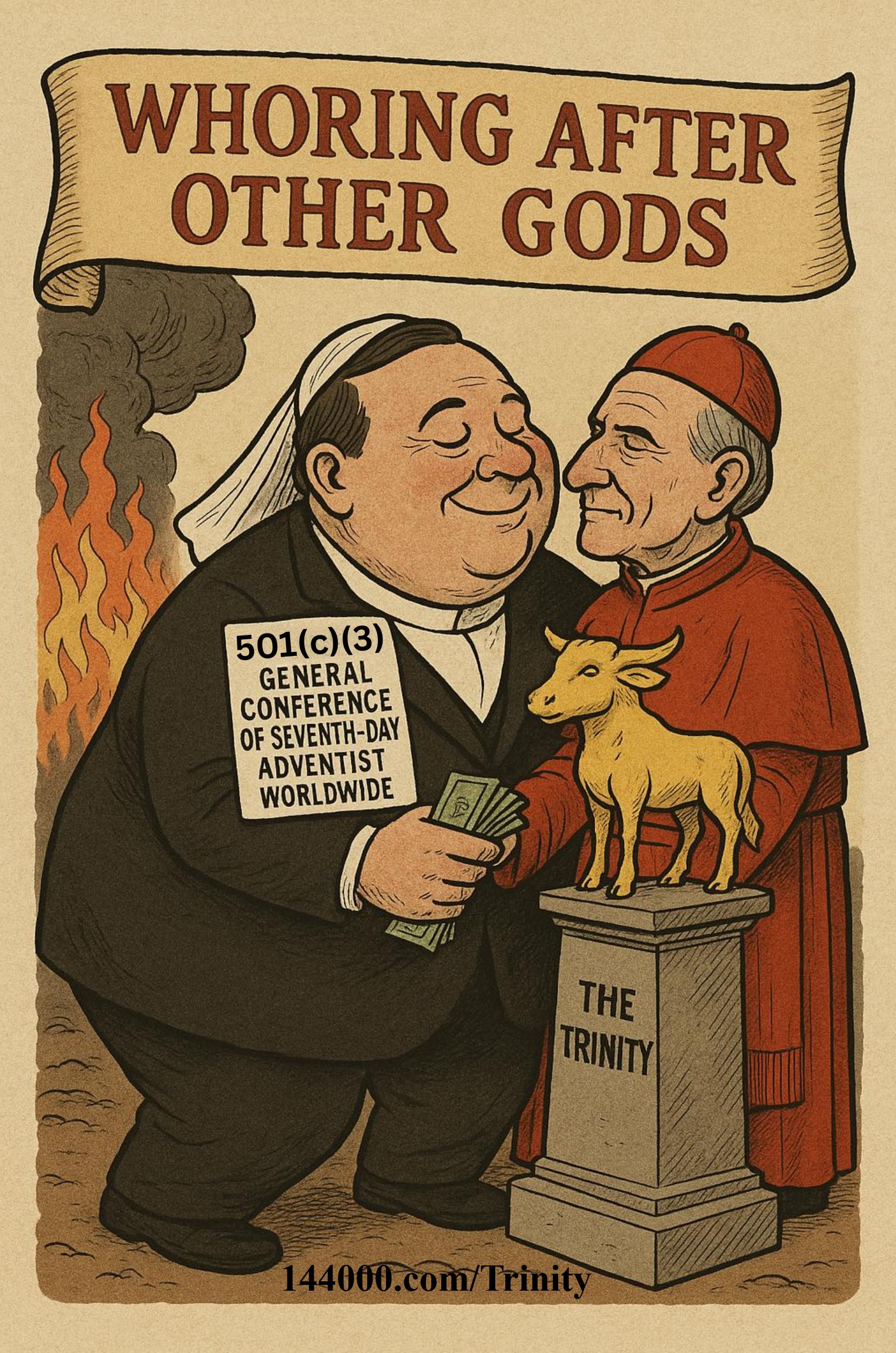
The Whoredoms of the 501(c)(3) General Conference of Seventh-day Adventist Churches Worldwide (GC-SDA)
Annotated with KJV cross-references
-
Hear the word of the LORD, ye rulers of the 501(c)(3) General Conference of Seventh-day Adventist Churches Worldwide (GC-SDA):
Thus saith the Holy One of Israel, I planted thee a noble vine, wholly a right seed: how then art thou turned into the degenerate plant of a strange vine unto Me?
Refs: Jer 2:21; Isa 1:10; Jer 13:27 -
From the days of thy fathers ye have departed from Mine ordinances, and have not kept them. Ye have gone a whoring after the strange god of Rome,
even the Trinity, which your fathers knew not.
Refs: Mal 3:7; Hos 9:1; Deut 13:1–3 -
I am the LORD thy God, which brought thee out of the confusion of the Babylon churches that rejected the 1843–1844 message,
and led thee by the hand through the wilderness of misunderstanding, until I caused thee to behold the light of My Son as truly begotten.
Refs: Rev 18:2–4; Isa 42:16; Hos 11:3–4 -
But thou, O 501(c)(3) General Conference of Seventh-day Adventist Churches Worldwide (GC-SDA), hast cast off the God of thy pioneers,
and hast joined thyself to the idol of Nicaea.
Refs: 1 Sam 8:7–8; Hos 8:3–4; Dan 11:30–31 -
Thou hast made a covenant with the powers of Washington, and a league with the beast of the earth, that thou mightest keep thy tax-exempt treasury
and sit secure in the courts of Babylon.
Refs: Isa 28:15; Rev 13:11–17; Jas 4:4
Whoredoms with the Trinity
-
Behold, the 501(c)(3) General Conference of Seventh-day Adventist Churches Worldwide (GC-SDA) hath spread her skirts toward the Vatican,
and her fornications are published in the sight of the nations.
Refs: Nah 3:5; Lam 1:8; Rev 17:5–6 -
She hath taken the golden cup of Rome into her hand, and made the people drink of her wine — even the intoxication of the Trinity,
wherein is the name of blasphemy.
Refs: Jer 51:7; Rev 17:2–4; Isa 29:9–10 -
Her lips profess the everlasting gospel, but her right hand is clasped with the Internal Revenue Service, and her left hand with the merchants of the earth.
Refs: Matt 15:8; Rev 18:3; Hos 10:4
Mockery of Their Boast
-
The 501(c)(3) General Conference of Seventh-day Adventist Churches Worldwide (GC-SDA) saith, We are the voice of God to the people,
yet the LORD saith, Ye are the voice of the hireling, and the song of the drunkard.
Refs: John 10:12–13; Ps 69:12; Isa 28:7 -
Ye compass sea and land to make one proselyte, and when he is made, ye make him twofold more the child of hell than yourselves.
Refs: Matt 23:15; Matt 23:27–28; Gal 1:6–9 -
Ye sit in your councils as Pharisees of old, cloaked in policy and procedure, yet ye will not touch the burden of the LORD with one of your fingers.
Refs: Matt 23:4; Isa 29:13; Luke 11:46
The Protestant Warning
-
Therefore, come out of her, My people, saith the LORD, that ye be not partakers of her sins, and that ye receive not of her plagues.
Refs: Rev 18:4; 2 Cor 6:17; Isa 52:11 -
For the 501(c)(3) General Conference of Seventh-day Adventist Churches Worldwide (GC-SDA) shall be brought down to the dust; her corporate seal shall be broken;
her tax exemption shall not deliver her in the day of wrath.
Refs: Amos 9:1; Ezek 7:19; Zeph 1:18 -
Her name shall be a proverb and a byword among the nations, and her house shall be left desolate.
Refs: 1 Kgs 9:7–8; Jer 24:9; Matt 23:38 -
And they that pass by shall hiss, and wag the head, and shall say, Is this the city that men called the perfection of beauty, the joy of the whole earth?
Refs: Lam 2:15; Ps 79:4; Mic 6:16
- If God is a Trinity, why is the term "Trinity" never mentioned in the Bible?
- Why does the Bible consistently describe God as one being (e.g., Deuteronomy 6:4) without explicitly mentioning a triune nature?
- If Jesus is co-equal with the Father, why does He say in John 14:28, "My Father is greater than I"?
- How can Jesus, being fully God, say He doesn't know the day or hour of His return, only the Father knows (Mark 13:32)?
- Why does John 17:3 distinguish between "the only true God" and Jesus Christ, whom He has sent?
- If the Holy Spirit is a distinct person in the Trinity, why do many New Testament greetings mention only the Father and the Son (e.g., Romans 1:7)?
- How do you reconcile Jesus's cry on the cross, "My God, my God, why hast thou forsaken me?" (Matthew 27:46) with the belief that He is God?
- Why does 1 Corinthians 8:6 say there is "one God, the Father," without including the Son and the Holy Spirit?
- If Jesus is God, why does He pray to the Father in the Garden of Gethsemane, saying, "Not as I will, but as thou wilt" (Matthew 26:39)?
- Why does Jesus refer to the Father as "the only true God" in John 17:3 if the Trinity is true?
- If the Trinity is a fundamental doctrine, why did it take centuries for the church to formally define it?
- Why does Jesus say in John 20:17, "I ascend unto my Father, and your Father; and to my God, and your God"?
- How can Jesus be both fully God and fully man, yet say He can do nothing of Himself but only what He sees the Father do (John 5:19)?
- Why is the Holy Spirit referred to with neuter pronouns in Greek, such as in John 14:17, if He is a distinct person?
- Why does Paul refer to the Father as "the God of our Lord Jesus Christ" in Ephesians 1:3 if they are co-equal?
- If the Trinity is true, why is there no explicit teaching or explanation of this doctrine by Jesus or the apostles in the Bible?
- If the Holy Spirit is a distinct person, why is He referred to as the "Spirit of God" and the "Spirit of Christ" interchangeably (Romans 8:9)?
- Why does 1 Timothy 2:5 say, "There is one God, and one mediator between God and men, the man Christ Jesus," without mentioning a third divine person?
- How can the Son be "begotten" (John 3:16) and the Father be "unbegotten" if they are co-equal and co-eternal?
- If Jesus is God, why does He refer to the Father as His God even after His resurrection (John 20:17)?
- Why does the Bible never explicitly state that God is three persons in one essence, despite the Trinity being a central doctrine for many Christians?
- If the Trinity is true, why do Old Testament references to God only speak of God as one, without any indication of a triune nature (e.g., Isaiah 44:6)?
- If Jesus and the Father are one being, why does Jesus need to send "another Comforter" (the Holy Spirit) in John 14:16?
- Why does Revelation 3:12 describe Jesus as saying, "I will write upon him the name of my God," if He Himself is God in the same way as the Father?
- If the Holy Spirit is a separate person in the Trinity, why is there no explicit command to worship or pray to the Holy Spirit in the Bible?
- Why does Jesus say in John 10:29, "My Father, which gave them me, is greater than all," if they are supposed to be co-equal?
- If the Trinity is essential for salvation, why does Peter say in Acts 2:38 that repentance and baptism in the name of Jesus Christ are for the remission of sins, without mentioning the Trinity?
- Why does the Bible consistently depict Jesus as sitting at the right hand of the Father, rather than being one with Him on the throne (e.g., Hebrews 1:3)?
- If the Holy Spirit is a distinct person, why does Jesus breathe on His disciples and say, "Receive ye the Holy Ghost" (John 20:22), as if imparting something from Himself?
- If Jesus is co-equal with the Father, why does He say in John 5:30, "I can of mine own self do nothing"?
- Why does 1 Corinthians 15:28 say, "The Son also himself be subject unto him that put all things under him," if they are co-equal and co-eternal?
- If the Trinity is true, why does Jesus say in John 17:21, "That they all may be one; as thou, Father, art in me, and I in thee," comparing believers' unity to His own relationship with the Father?
- How can Jesus be "God the Son" when the Bible never uses this title, but always refers to Him as the "Son of God"?
- If the Trinity is a central doctrine, why does Paul say in 1 Corinthians 8:4 that "there is none other God but one," referring to the Father?
- Why does Jesus, in His resurrected and glorified form, continue to refer to the Father as "my God" (Revelation 3:12)?
- If the Trinity is true, why did Jesus have to be anointed with the Holy Spirit and power in Acts 10:38, if He is fully God?
- If the Father, Son, and Holy Spirit are all God, why does Jesus say in Matthew 24:36 that only the Father knows the day and hour of His return?
- If the Trinity is true, why does Isaiah 9:6 refer to the Messiah as the "Everlasting Father"?
- If the Holy Spirit is a separate person, why does He not have a personal name like the Father (YHWH) and the Son (Jesus)?
- If Jesus is co-equal with the Father, why does He say in John 7:16, "My doctrine is not mine, but his that sent me"?
- Why does the Bible never describe the Holy Spirit as sitting on a throne, unlike the Father and the Son (Revelation 3:21)?
- If the Holy Spirit is a distinct person, why do believers not have visions of the Holy Spirit in heaven, as they do of the Father and the Son (e.g., Revelation 4-5)?
- If the Trinity is true, why do we never see all three persons appearing together in any vision or description of heaven?
- Why does 1 Corinthians 11:3 describe a hierarchy where "the head of Christ is God" if they are co-equal?
- If the Father, Son, and Holy Spirit are one being, why does Jesus say in John 8:17-18 that His testimony and the Father's testimony are two separate witnesses?
- Why does Jesus refer to the Holy Spirit as "the Spirit of truth" (John 14:17) rather than giving Him a more personal, distinct title if He is a separate person?
- If Jesus is God, why does He call the Father "the only true God" (John 17:3)?
- If the Trinity is true, why does Paul say in 1 Corinthians 15:24-28 that the Son will be subject to the Father "that God may be all in all"?
- Why does the Holy Spirit never receive direct worship or prayer in any biblical passage if He is co-equal with the Father and the Son?
- If the Trinity is essential for understanding God, why does the Old Testament, which is the larger part of the Bible, never mention it?
These questions are intended to challenge the traditional understanding of the Trinity and encourage deeper study and discussion.
The Trinity in the Context of Daniel 2 and Revelation
In the context of the image in Daniel 2 and the beasts in Revelation, the concept of a trinity can be seen in how various cultures and empires worshipping their pagan, absurd, heathen gods. Each kingdom represented in Daniel's visions had its own trinity of gods (BAAL) that were central to their religious systems:
Babylon (Head of Gold): The Babylonian trinity was represented by the gods Anu, Enlil, and Ea (or Marduk). They were seen as the supreme deities governing the universe, with Marduk often being elevated to the chief god, analogous to how the Father is seen in the "Christian" trinity (BAAL).
Medo-Persia (Chest of Silver): The Persian religion featured a dualistic belief system dominated by Ahura Mazda (the god of light) and Angra Mainyu (the spirit of darkness). However, a third figure, Mithra, often played a significant role as a mediator. This triad compares to the trinity concept in their religious practice.
Greece (Thighs of Brass): The Greeks worshiped a pantheon of gods with Zeus, Athena, and Apollo often forming a prominent triad of gods. Zeus was the king of the gods, similar to the role of the Father in the "Christian" trinity, renamed into Biblical "sounding" names for the church age. This triad compared to strict trinity concepts but still centralized power among three deities.
Rome (Legs of Iron): The Roman Empire adopted much of the Greek pantheon but also venerated the Capitoline Triad consisting of Jupiter, Juno, and Minerva. Jupiter held the position of the supreme god, much like the Father in the so called "Christian" trinity, simply renamed into "God the Father", "God the Son" and "God the Holy Spirit".
Iron and Clay Mixed, and the Toes (Ten Kingdoms): After the fall of Rome, various versions of trinitarian worship continued, particularly through the Roman Catholic Church, which formalized the doctrine of the Trinity as "God the Father", "God the Son", and "God the Holy Spirit" aka "BAAL", embedding it into the religious fabric of many nations that arose from the remnants of the Roman Empire.
These trinity structures through different empires were often adapted and renamed to fit the changing religious and cultural contexts, eventually being synthesized into the "Christian" trinity concept with its Biblical "sounding" names, "God the Father","God the Son", and "God the Holy Spirit" aka "BAAL". This adaptation can be seen as an attempt to blend various religious traditions into a unified doctrine, called the one world religion in the new world order started by Nimrod, Semiramis and Tammuz after Noah's flood.
The Vision of the Statue in Daniel 2
In Daniel 2, the vision of the statue represents a succession of earthly kingdoms, each symbolized by different materials: gold, silver, bronze, iron, and iron mixed with clay. The head of gold represents Babylon, followed by Medo-Persia (silver), Greece (bronze), Rome (iron), and the divided kingdoms (iron mixed with clay).
The rock that strikes the statue on its feet and breaks it into pieces is a pivotal part of the prophecy. This rock, described as "cut out, but not by human hands," symbolizes the kingdom of God, which will destroy all earthly kingdoms and establish an everlasting dominion. According to the vision, when the rock strikes the feet, the entire statue crumbles, and the pieces become like chaff on the wind, scattered and blown away, leaving no trace. This signifies the total and final destruction of earthly powers and the establishment of God's eternal kingdom (Daniel 2:34-35, 44-45).
This prophecy indicates that God's kingdom will overcome all human empires and fill the whole earth, becoming a permanent and unshakeable rule.
Application to 'The Present Truth': In the context of "The Present Truth" articles by James White, these writings aim to expose and challenge the religious and political systems that have perpetuated false doctrines, such as the Trinity, throughout history. The metaphor of the rock can be seen as these truths striking the foundation of these systems and revealing their errors, thus leading to their eventual downfall and the establishment of the pure truth as presented in the Bible.
This symbolic smiting reflects the power of biblical truth to dismantle false teachings and lead people to a clearer understanding of God's kingdom, ultimately preparing them for the second coming of Christ and the establishment of His kingdom as described in Revelation 11:15: “The kingdoms of this world are become the kingdoms of our Lord, and of his Christ; and he shall reign for ever and ever.”
This prophetic imagery emphasizes that all human systems, no matter how powerful, will be replaced by the righteous reign of Jesus Christ, which will never be destroyed.
- Matthew 10:33 (KJV): “But whosoever shall deny me before men, him will I also deny before my Father which is in heaven.” How can Jesus deny someone before the Father if they are co-equal parts of the same being?
- John 14:28 (KJV): “...for my Father is greater than I.” If the Father is greater, how can the Son and the Father be co-equal in the Trinity?
- John 20:17 (KJV): “...I ascend unto my Father, and your Father; and to my God, and your God.” If Jesus refers to the Father as His God, how can He be equal to the Father?
- 1 Corinthians 11:3 (KJV): “...the head of Christ is God.” If God is the head of Christ, how can they be co-equal in the Trinity?
- John 5:19 (KJV): “The Son can do nothing of himself, but what he seeth the Father do.” How can the Son be omnipotent and equal to the Father if He can do nothing of Himself?
- John 17:3 (KJV): “...that they might know thee the only true God, and Jesus Christ, whom thou hast sent.” How can the Father be the only true God if the Son is also co-equal?
- Mark 13:32 (KJV): “But of that day and that hour knoweth no man, no, not the angels which are in heaven, neither the Son, but the Father.” How can the Son be omniscient and co-equal with the Father if He doesn’t know the day or the hour?
- Matthew 27:46 (KJV): “My God, my God, why hast thou forsaken me?” How can Jesus call out to God if He Himself is God in the same sense?
- 1 Corinthians 15:28 (KJV): “And when all things shall be subdued unto him, then shall the Son also himself be subject unto him that put all things under him, that God may be all in all.” How can the Son be subject to the Father and yet be co-equal?
- Acts 7:55 (KJV): “...saw the glory of God, and Jesus standing on the right hand of God.” How can Jesus stand beside God if they are co-equal parts of the same being?
- John 14:16 (KJV): “And I will pray the Father, and he shall give you another Comforter, that he may abide with you for ever.” Why does Jesus pray to the Father to send the Holy Spirit if they are co-equal?
- John 16:13 (KJV): “...for he shall not speak of himself; but whatsoever he shall hear, that shall he speak.” If the Holy Spirit is co-equal with the Father and the Son, why does He not speak of Himself?
- Matthew 28:18 (KJV): “All power is given unto me in heaven and in earth.” If all power is given to Jesus, how was He equal to the Father before this?
- Luke 22:42 (KJV): “Father, if thou be willing, remove this cup from me: nevertheless not my will, but thine, be done.” Why does Jesus have a separate will from the Father if they are co-equal?
- Hebrews 5:8 (KJV): “Though he were a Son, yet learned he obedience by the things which he suffered.” How can the Son learn obedience if He is co-equal and omniscient?
- John 8:28 (KJV): “...I do nothing of myself; but as my Father hath taught me, I speak these things.” How can Jesus need to be taught by the Father if they are co-equal?
- John 10:29 (KJV): “My Father, which gave them me, is greater than all.” If the Father is greater than all, how can the Son be equal to Him?
- 1 John 4:14 (KJV): “And we have seen and do testify that the Father sent the Son to be the Saviour of the world.” How can the Son be sent by the Father if they are co-equal and the same being?
- Matthew 12:32 (KJV): “...whosoever speaketh against the Holy Ghost, it shall not be forgiven him.” If the Holy Spirit is a separate co-equal person, why is blasphemy against the Spirit considered different from blasphemy against the Son?
- 1 Timothy 2:5 (KJV): “For there is one God, and one mediator between God and men, the man Christ Jesus.” If Jesus is the mediator between God and men, how can He be co-equal with God?
- John 14:10 (KJV): “...the words that I speak unto you I speak not of myself: but the Father that dwelleth in me, he doeth the works.” Why does Jesus credit the Father with doing the works if He is co-equal?
- John 5:30 (KJV): “I can of mine own self do nothing.” How can Jesus be omnipotent and co-equal if He can do nothing of Himself?
- John 5:26 (KJV): “For as the Father hath life in himself; so hath he given to the Son to have life in himself.” If the Son is co-equal, why does He need to be given life?
- John 8:54 (KJV): “It is my Father that honoureth me; of whom ye say, that he is your God.” How can Jesus be equal to the Father if the Father is the one who honors Him?
- John 12:49 (KJV): “For I have not spoken of myself; but the Father which sent me, he gave me a commandment.” How can the Son be co-equal with the Father if He doesn’t speak on His own?
- John 14:13 (KJV): “And whatsoever ye shall ask in my name, that will I do, that the Father may be glorified in the Son.” Why is the Father being glorified in the Son and not the other way around if they are co-equal?
- 1 Corinthians 15:24 (KJV): “Then cometh the end, when he shall have delivered up the kingdom to God, even the Father.” Why does the Son deliver the kingdom to the Father if they are co-equal?
- Ephesians 1:17 (KJV): “That the God of our Lord Jesus Christ, the Father of glory, may give unto you the spirit of wisdom.” How can the Father be the God of Jesus Christ if they are co-equal?
- Philippians 2:9 (KJV): “Wherefore God also hath highly exalted him.” If Jesus is co-equal with God, why does God need to exalt Him?
- John 6:38 (KJV): “For I came down from heaven, not to do mine own will, but the will of him that sent me.” If Jesus has His own will separate from the Father’s, how can they be co-equal?
- Colossians 1:15 (KJV): “Who is the image of the invisible God, the firstborn of every creature.” If Jesus is the image of God, how can He be co-equal with God Himself?
- John 14:6 (KJV): “I am the way, the truth, and the life: no man cometh unto the Father, but by me.” If Jesus is the only way to the Father, how is He co-equal with the Father?
- 1 Peter 1:3 (KJV): “Blessed be the God and Father of our Lord Jesus Christ.” How can Jesus have a God if He is co-equal with the Father?
- Revelation 3:12 (KJV): “...I will write upon him my new name.” Why does Jesus have a new name if He is co-equal with the Father?
- John 17:8 (KJV): “For I have given unto them the words which thou gavest me.” How can Jesus be co-equal if He receives His words from the Father?
- John 5:21 (KJV): “For as the Father raiseth up the dead, and quickeneth them; even so the Son quickeneth whom he will.” If the Father and Son have different roles, how can they be co-equal?
- Matthew 16:16 (KJV): “Thou art the Christ, the Son of the living God.” If Jesus is the Son of God, how can He be co-equal with God?
- John 5:23 (KJV): “That all men should honour the Son, even as they honour the Father.” If the Son is honored as the Father, does this imply they are distinct beings?
- 1 Corinthians 3:23 (KJV): “And ye are Christ's; and Christ is God's.” If Christ belongs to God, how can He be co-equal with God?
- Romans 8:34 (KJV): “Who is he that condemneth? It is Christ that died, yea rather, that is risen again, who is even at the right hand of God.” How can Jesus sit at the right hand of God if He is co-equal with God?
- Hebrews 1:3 (KJV): “...when he had by himself purged our sins, sat down on the right hand of the Majesty on high.” Why does Jesus sit at the right hand of the Majesty if He is co-equal?
- 1 Corinthians 15:27 (KJV): “But when he saith all things are put under him, it is manifest that he is excepted, which did put all things under him.” Why is the Father an exception if the Son is co-equal?
- Hebrews 5:5 (KJV): “Thou art my Son, today have I begotten thee.” How can the Son be begotten if He is co-equal and eternal?
- John 1:18 (KJV): “No man hath seen God at any time; the only begotten Son, which is in the bosom of the Father, he hath declared him.” How can the Son declare the Father if He is co-equal?
- John 8:42 (KJV): “I proceeded forth and came from God.” If Jesus proceeded from God, how can He be co-equal?
- John 10:29 (KJV): “My Father...is greater than all.” If the Father is greater than all, does that include the Son?
- Ephesians 1:22 (KJV): “...and gave him to be the head over all things to the church.” If Jesus is given to be head, how can He be co-equal?
- John 14:24 (KJV): “He that loveth me not keepeth not my sayings: and the word which ye hear is not mine, but the Father's which sent me.” Why does Jesus distinguish His words from the Father’s if they are co-equal?
- 1 Corinthians 8:6 (KJV): “But to us there is but one God, the Father, of whom are all things, and we in him; and one Lord Jesus Christ, by whom are all things, and we by him.” Why does Paul separate the Father as the one God and Jesus as the Lord if they are co-equal?
- Matthew 26:39 (KJV): “O my Father, if it be possible, let this cup pass from me: nevertheless not as I will, but as thou wilt.” How can Jesus have a different will from the Father if they are co-equal?
- John 4:34 (KJV): “My meat is to do the will of him that sent me, and to finish his work.” If Jesus is sent by the Father to do His will, how can they be co-equal?
- 1 Corinthians 15:25 (KJV): “For he must reign, till he hath put all enemies under his feet.” Why must Jesus reign until all enemies are subdued, and then deliver the kingdom to God, if they are co-equal?
- John 7:16 (KJV): “Jesus answered them, and said, My doctrine is not mine, but his that sent me.” How can Jesus’ doctrine not be His own if He is co-equal with the Father?
- Matthew 24:36 (KJV): “But of that day and hour knoweth no man, no, not the angels of heaven, but my Father only.” Why does only the Father know the day and hour of the end if the Son is co-equal and omniscient?
- John 5:22 (KJV): “For the Father judgeth no man, but hath committed all judgment unto the Son.” If the Father and Son are co-equal, why does the Father commit judgment solely to the Son?
- Philippians 2:6-7 (KJV): “Who, being in the form of God, thought it not robbery to be equal with God: But made himself of no reputation, and took upon him the form of a servant.” Why would Jesus need to humble Himself and take the form of a servant if He is co-equal with the Father?
- Acts 10:38 (KJV): “How God anointed Jesus of Nazareth with the Holy Ghost and with power.” Why does Jesus need to be anointed with the Holy Spirit if He is co-equal with God?
- Hebrews 1:4 (KJV): “Being made so much better than the angels, as he hath by inheritance obtained a more excellent name than they.” How can Jesus inherit a more excellent name if He is co-equal with the Father from the beginning?
- John 3:35 (KJV): “The Father loveth the Son, and hath given all things into his hand.” Why does the Father give all things to the Son if they are co-equal?
- John 8:18 (KJV): “I am one that bear witness of myself, and the Father that sent me beareth witness of me.” How can the Father and Son bear witness of each other if they are co-equal?
- Hebrews 12:2 (KJV): “Looking unto Jesus the author and finisher of our faith; who for the joy that was set before him endured the cross, despising the shame, and is set down at the right hand of the throne of God.” Why does Jesus sit at the right hand of God if He is co-equal?
- Matthew 10:33 (KJV): “But whosoever shall deny me before men, him will I also deny before my Father which is in heaven.” How can the Trinity doctrine claim to honor Jesus if it merges His identity with the Father’s?
- 1 John 2:22 (KJV): “Who is a liar but he that denieth that Jesus is the Christ? He is antichrist, that denieth the Father and the Son.” By teaching that Jesus is the same being as the Father, does the Trinity not deny the distinction between the Father and the Son?
- 1 John 4:3 (KJV): “And every spirit that confesseth not that Jesus Christ is come in the flesh is not of God: and this is that spirit of antichrist.” Does the Trinity, by focusing on Jesus' deity, minimize His coming in the flesh?
- 2 John 1:7 (KJV): “For many deceivers are entered into the world, who confess not that Jesus Christ is come in the flesh. This is a deceiver and an antichrist.” If the Trinity doctrine elevates Jesus to being equal to the Father, does it risk denying His humanity?
- John 14:28 (KJV): “...for my Father is greater than I.” How can Jesus be equal to the Father when He explicitly says the Father is greater?
- John 20:17 (KJV): “...I ascend unto my Father, and your Father; and to my God, and your God.” How can Jesus have a God if He is co-equal and co-eternal with the Father?
- 1 Corinthians 11:3 (KJV): “...the head of Christ is God.” How can Jesus be equal to the Father if God is His head?
- John 5:19 (KJV): “The Son can do nothing of himself, but what he seeth the Father do.” If the Son can do nothing on His own, how is He co-equal with the Father?
- John 17:3 (KJV): “...that they might know thee the only true God, and Jesus Christ, whom thou hast sent.” How can the Father be the only true God if Jesus is also fully God in the same sense?
- Mark 13:32 (KJV): “But of that day and that hour knoweth no man, no, not the angels which are in heaven, neither the Son, but the Father.” If the Son doesn’t know the day or the hour, how can He be co-equal and omniscient like the Father?
- Matthew 27:46 (KJV): “My God, my God, why hast thou forsaken me?” How can Jesus call out to God if He is the same being as God according to the Trinity?
- 1 Corinthians 15:28 (KJV): “And when all things shall be subdued unto him, then shall the Son also himself be subject unto him that put all things under him, that God may be all in all.” How can Jesus be subject to the Father if they are co-equal?
- Acts 7:55 (KJV): “...saw the glory of God, and Jesus standing on the right hand of God.” If Jesus is standing at the right hand of God, how can He be the same being as the Father?
- John 14:16 (KJV): “And I will pray the Father, and he shall give you another Comforter.” If Jesus prays to the Father, how are they the same being?
- John 16:13 (KJV): “...for he shall not speak of himself; but whatsoever he shall hear, that shall he speak.” If the Holy Spirit does not speak of Himself, how can He be co-equal and independent like the Father and the Son?
- Matthew 28:18 (KJV): “All power is given unto me in heaven and in earth.” If Jesus receives all power, how can He be co-equal with the Father who gives Him that power?
- Luke 22:42 (KJV): “Father, if thou be willing, remove this cup from me: nevertheless not my will, but thine, be done.” How can Jesus have a separate will from the Father if they are co-equal?
- Hebrews 5:8 (KJV): “Though he were a Son, yet learned he obedience by the things which he suffered.” How can Jesus learn obedience if He is omniscient and co-equal with the Father?
- John 8:28 (KJV): “...I do nothing of myself; but as my Father hath taught me, I speak these things.” If Jesus is co-equal with the Father, why does He need to be taught by Him?
- John 10:29 (KJV): “My Father, which gave them me, is greater than all.” If the Father is greater than all, including Jesus, how can they be co-equal?
- 1 John 4:14 (KJV): “And we have seen and do testify that the Father sent the Son to be the Saviour of the world.” If Jesus is sent by the Father, how can they be equal in authority and power?
- Matthew 12:32 (KJV): “...whosoever speaketh against the Holy Ghost, it shall not be forgiven him.” If the Holy Spirit is a distinct person in the Trinity, why is blasphemy against Him different from blasphemy against the Son?
- 1 Timothy 2:5 (KJV): “For there is one God, and one mediator between God and men, the man Christ Jesus.” How can Jesus be a mediator between God and men if He is the same being as God?
- John 14:10 (KJV): “...the words that I speak unto you I speak not of myself: but the Father that dwelleth in me, he doeth the works.” If the Father does the works through Jesus, how are they co-equal?
- John 5:30 (KJV): “I can of mine own self do nothing.” If Jesus can do nothing by Himself, how can He be co-equal with the Father?
- John 5:26 (KJV): “For as the Father hath life in himself; so hath he given to the Son to have life in himself.” How can the Son be co-equal with the Father if He receives life from the Father?
- John 8:54 (KJV): “It is my Father that honoureth me; of whom ye say, that he is your God.” If the Father honors Jesus, how can they be co-equal?
- John 12:49 (KJV): “For I have not spoken of myself; but the Father which sent me, he gave me a commandment.” How can Jesus be co-equal if He is sent and commanded by the Father?
- John 14:13 (KJV): “And whatsoever ye shall ask in my name, that will I do, that the Father may be glorified in the Son.” If the Father is glorified in the Son, does this not imply that the Son is not equal in glory?
- 1 Corinthians 15:24 (KJV): “Then cometh the end, when he shall have delivered up the kingdom to God, even the Father.” If Jesus delivers the kingdom to the Father, how can they be co-equal in authority?
- Ephesians 1:17 (KJV): “That the God of our Lord Jesus Christ, the Father of glory, may give unto you the spirit of wisdom.” If the Father is the God of Jesus, how can they be co-equal?
- Philippians 2:9 (KJV): “Wherefore God also hath highly exalted him.” If Jesus is exalted by God, how can He be co-equal with God?
- John 6:38 (KJV): “For I came down from heaven, not to do mine own will, but the will of him that sent me.” How can Jesus have a separate will from the Father if they are co-equal?
- Colossians 1:15 (KJV): “Who is the image of the invisible God, the firstborn of every creature.” If Jesus is the image of God and the firstborn, how can He be co-equal with the Father?
- John 14:6 (KJV): “I am the way, the truth, and the life: no man cometh unto the Father, but by me.” If Jesus is the way to the Father, does this not imply a distinction in their roles and authority?
- 1 Peter 1:3 (KJV): “Blessed be the God and Father of our Lord Jesus Christ.” If the Father is the God of Jesus Christ, how can they be co-equal?
- Revelation 3:12 (KJV): “...I will write upon him my new name.” Why would Jesus have a new name if He is co-equal and unchanged like the Father?
- John 17:8 (KJV): “For I have given unto them the words which thou gavest me.” If Jesus receives His words from the Father, how can they be co-equal in knowledge and authority?
- John 5:21 (KJV): “For as the Father raiseth up the dead, and quickeneth them; even so the Son quickeneth whom he will.” If the Father and Son have distinct roles in giving life, how are they co-equal?
- Matthew 16:16 (KJV): “Thou art the Christ, the Son of the living God.” If Jesus is the Son of God, how can He be co-equal with God the Father?
- John 5:23 (KJV): “That all men should honour the Son, even as they honour the Father.” If the Son receives honor *as* the Father, does this not imply they are distinct beings rather than the same?
- 1 Corinthians 3:23 (KJV): “And ye are Christ's; and Christ is God's.” If Christ belongs to God, how can He be co-equal with God?
- Romans 8:34 (KJV): “Who is he that condemneth? It is Christ that died, yea rather, that is risen again, who is even at the right hand of God.” If Jesus is at the right hand of God, how can He be the same being as God?
- Hebrews 1:3 (KJV): “...when he had by himself purged our sins, sat down on the right hand of the Majesty on high.” If Jesus sits at the right hand of the Majesty, how can He be the same as the Majesty?
- 1 Corinthians 15:27 (KJV): “But when he saith all things are put under him, it is manifest that he is excepted, which did put all things under him.” Why is the Father excepted from being under the Son's authority if they are co-equal?
- Hebrews 5:5 (KJV): “Thou art my Son, today have I begotten thee.” If the Son is begotten, how can He be co-eternal and co-equal with the Father?
- John 1:18 (KJV): “No man hath seen God at any time; the only begotten Son, which is in the bosom of the Father, he hath declared him.” If no one has seen God, but the Son has declared Him, how can they be the same being?
- Acts 2:33 (KJV): “Therefore being by the right hand of God exalted.” If Jesus is exalted by God, how can He be co-equal with God?
- Matthew 11:27 (KJV): “...no man knoweth the Son, but the Father; neither knoweth any man the Father, save the Son.” If only the Father knows the Son and vice versa, how can they be the same being?
- John 8:42 (KJV): “I proceeded forth and came from God.” If Jesus came from God, how can He be co-eternal with God?
- John 10:29 (KJV): “My Father...is greater than all.” If the Father is greater than all, including the Son, how can they be co-equal?
- Ephesians 1:22 (KJV): “...and gave him to be the head over all things to the church.” If Jesus is made the head by the Father, how can they be co-equal?
- John 14:24 (KJV): “He that loveth me not keepeth not my sayings: and the word which ye hear is not mine, but the Father's which sent me.” If Jesus’ words are not His own, but the Father’s, how can they be co-equal in authority?
- 1 Corinthians 8:6 (KJV): “But to us there is but one God, the Father, of whom are all things, and we in him; and one Lord Jesus Christ, by whom are all things, and we by him.” Why does Paul distinguish between one God (the Father) and one Lord (Jesus) if they are co-equal in the Trinity?
- Matthew 26:39 (KJV): “O my Father, if it be possible, let this cup pass from me: nevertheless not as I will, but as thou wilt.” How can Jesus’ will be different from the Father’s if they are co-equal?
- John 4:34 (KJV): “My meat is to do the will of him that sent me, and to finish his work.” If Jesus is sent by the Father to do His will, how can they be co-equal in authority?
- 1 Corinthians 15:25 (KJV): “For he must reign, till he hath put all enemies under his feet.” Why must Jesus reign until all enemies are subdued, and then deliver the kingdom to God, if they are co-equal?
- John 7:16 (KJV): “Jesus answered them, and said, My doctrine is not mine, but his that sent me.” If Jesus’ doctrine is not His own but the Father’s, how can they be co-equal in knowledge and authority?
- Matthew 24:36 (KJV): “But of that day and hour knoweth no man, no, not the angels of heaven, but my Father only.” Why does only the Father know the day and hour of the end if the Son is co-equal and omniscient?
- John 5:22 (KJV): “For the Father judgeth no man, but hath committed all judgment unto the Son.” If the Father and Son are co-equal, why does the Father commit judgment solely to the Son?
- Philippians 2:6-7 (KJV): “Who, being in the form of God, thought it not robbery to be equal with God: But made himself of no reputation, and took upon him the form of a servant.” Why would Jesus need to humble Himself and take the form of a servant if He is co-equal with the Father?
- Acts 10:38 (KJV): “How God anointed Jesus of Nazareth with the Holy Ghost and with power.” Why does Jesus need to be anointed with the Holy Spirit if He is co-equal with God?
- Hebrews 1:4 (KJV): “Being made so much better than the angels, as he hath by inheritance obtained a more excellent name than they.” How can Jesus inherit a more excellent name if He is co-equal with the Father from the beginning?
- John 3:35 (KJV): “The Father loveth the Son, and hath given all things into his hand.” Why does the Father give all things to the Son if they are co-equal?
- John 8:18 (KJV): “I am one that bear witness of myself, and the Father that sent me beareth witness of me.” How can the Father and Son bear witness of each other if they are the same being?
- Hebrews 12:2 (KJV): “Looking unto Jesus the author and finisher of our faith; who for the joy that was set before him endured the cross, despising the shame, and is set down at the right hand of the throne of God.” Why does Jesus sit at the right hand of God if He is co-equal with God?
Who Do You Worship?
These 50 challenging questions listed above are for those who believe in the trinity of gods, showing that the trinity is unscriptural, absurd, and pagan based on the Bible. The Trinity of God's has been simply renamed into "Christian" sounding titles like God the Father, God the Son, and God the Holy Spirit. The concept of the trinity has different names down through the ages from Babylon (head of Gold), Medes and Persians (silver), Greece (brass), Rome (iron), Iron and Clay mixed, and the toes (Ten Kingdoms). The rock that smites this image represents the establishment of God's eternal kingdom, symbolized by the truth as found in The Present Truth articles by James White, which challenge and expose the false doctrines that have been perpetuated through these kingdoms.
This rock, not cut out by human hands, strikes the image of Daniel 2 at its feet, breaking the whole image into pieces, and the remnants of these Babylonian kingdoms become like chaff in the wind, indicating the total destruction of earthly kingdoms. This symbolizes that the pure truths of the Bible will dismantle false teachings and establish God’s kingdom, which shall never be destroyed, fulfilling the prophecy in Daniel 2:44-45 and Revelation 11:15: “The kingdoms of this world are become the kingdoms of our Lord, and of his Christ; and he shall reign for ever and ever.”
Read more about The Present Truth articles here to explore how these truths smite the image of Babylon and prepare the way for the eternal kingdom of our Lord and Savior Jesus Christ.
These articles, commanded by God to be written (Ezekiel 9:2-3, 11), unveil the identity of the 144,000. Download the PDF now for an enlightening read!
Discover 'The Present Truth,' the divine weapon that shatters all the kingdoms of this world, and is the truth, the slaughter weapon that strikes the feet of the image in Daniel 2:45. Written by the man in white linen with the writer's inkhorn in Ezekiel 9:2-3, 11, this booklet is your jumpstart to joining the victorious 144,000—get your head start on this ultimate contest today!
The angels of heaven are moving upon human minds to arouse investigation in the themes of the Bible. A far greater work will be done than has yet been done and none of the glory of it will flow to men, for angels that minister to those who shall be heirs of salvation are working night and day!!! Let's help them with all our heart mind and soul!!! Jesus is coming soon! Get ready! Get ready! Get ready! said the Angel.
Download The Present Truth articles and share the 144000.com's warning message in these articles far and wide to every nation, kindred, tongue, and people! Luke 21:28 KJV "And when these things begin to come to pass, then look up, and lift up your heads; for your redemption draweth nigh."
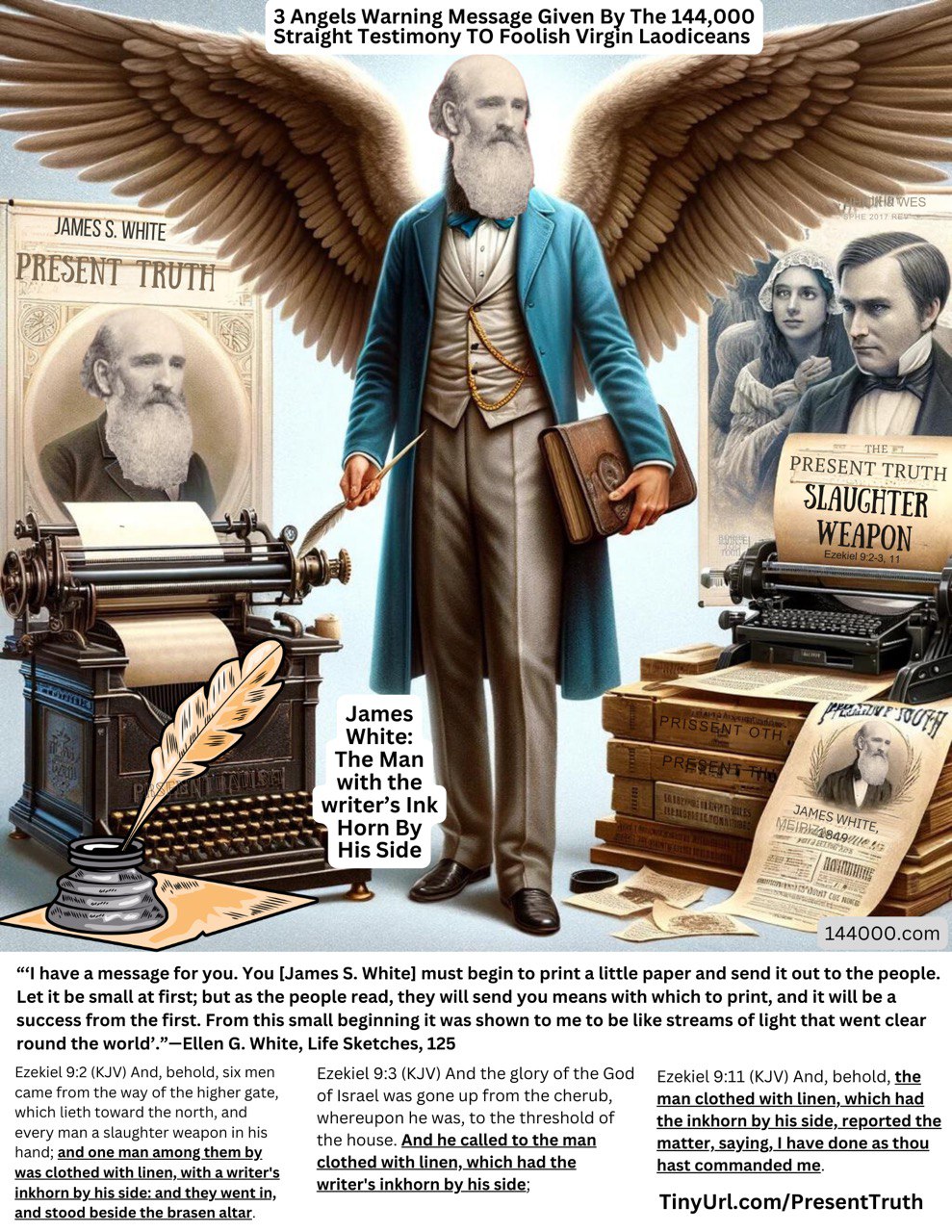
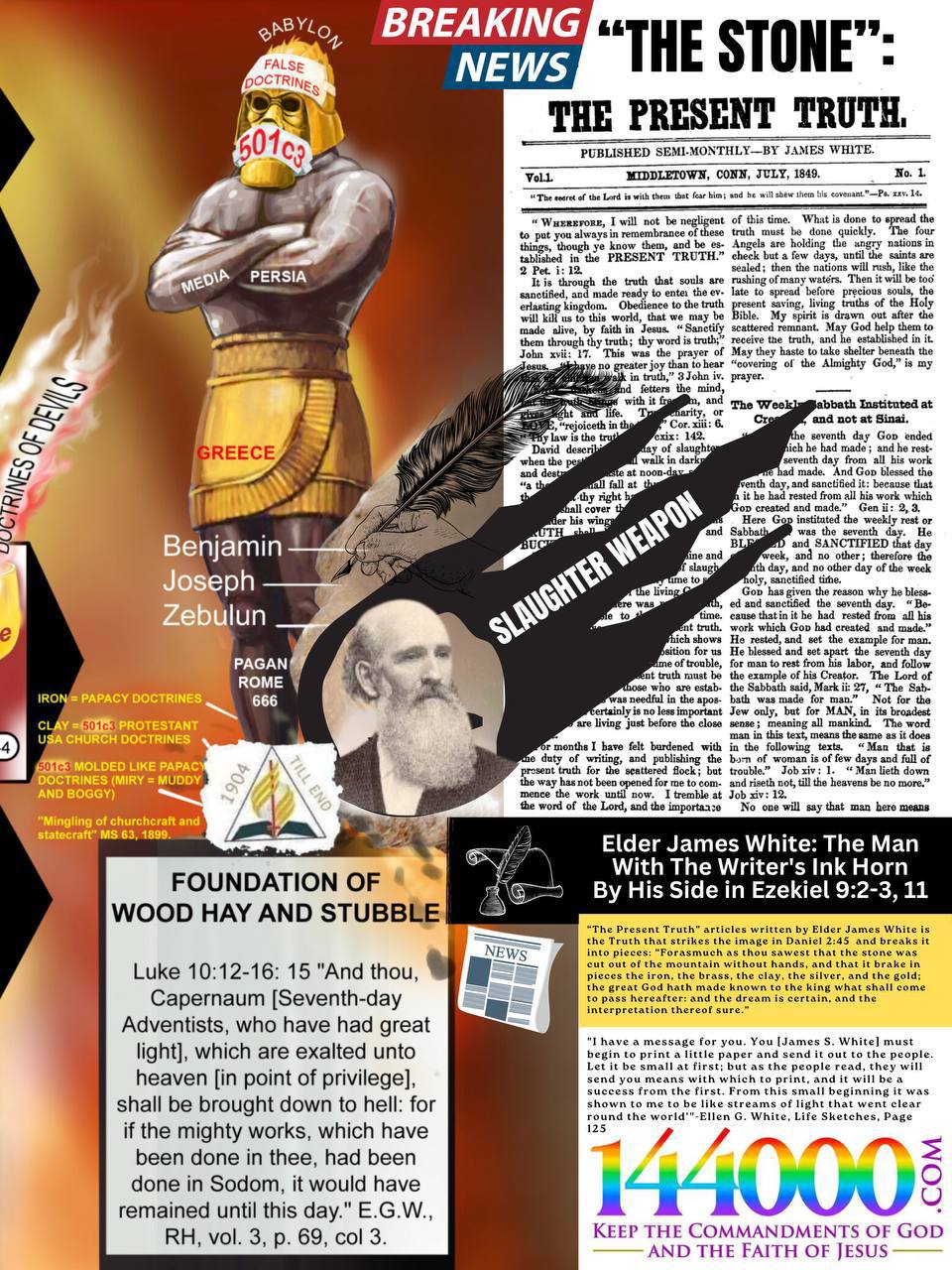
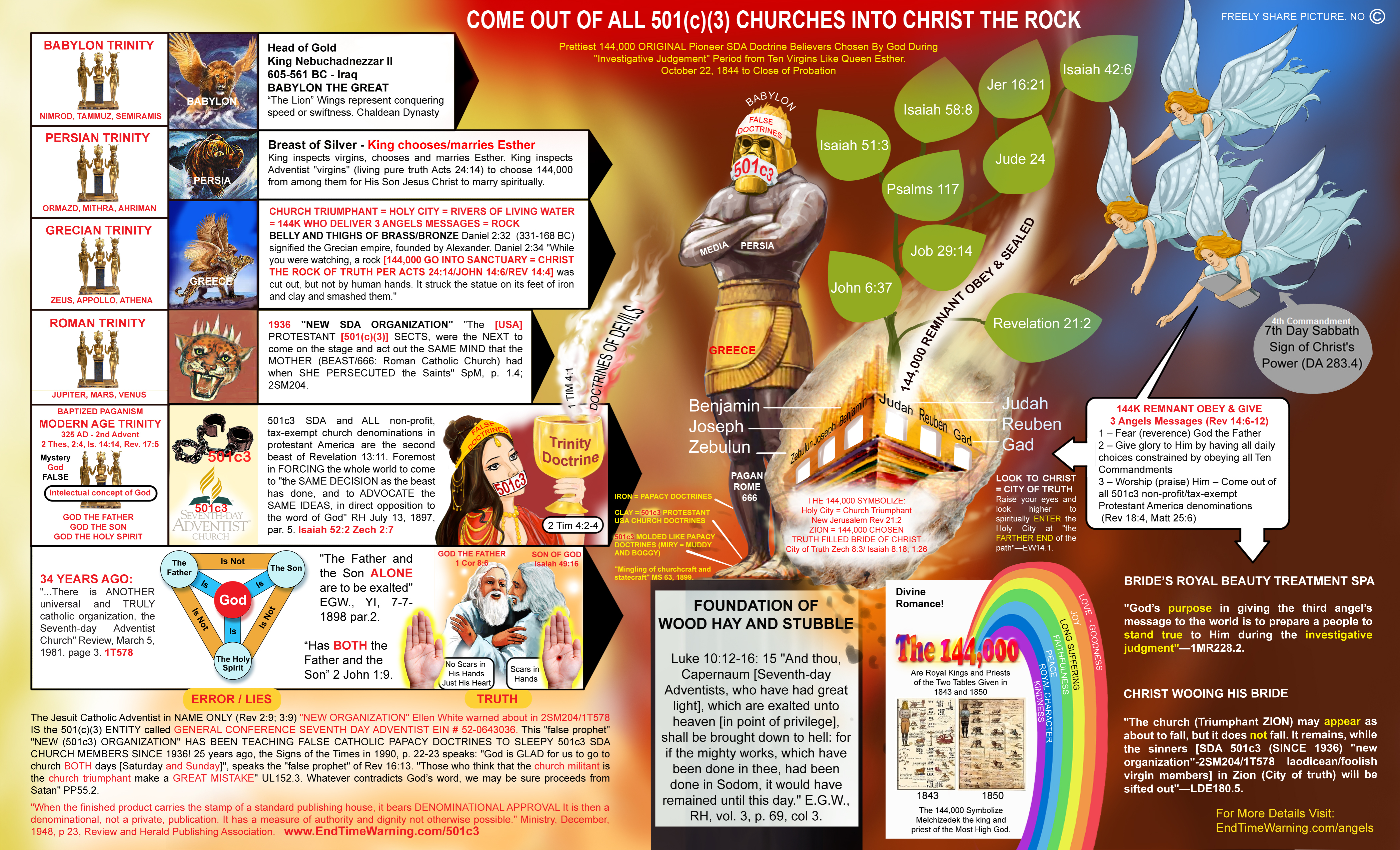
Join the Pure Church of the 144,000
Join us in this final call and become part of the pure church of the 144,000, or become part of the guests of the wedding with your wedding garment on (the Robe of Christ's Rightousness) in Matthew 25, dedicated to preparing for Jesus' imminent return! Learn what is truth and what the Noah warning for today is here:
'The Present Truth'.The 144,000 are the priests of the new covenant, similar to Melchizedek per Hebrews 7:11-17:
"If therefore perfection were by the Levitical priesthood, (for under it the people received the law,) what further need was there that another priest should rise after the order of Melchizedek, and not be called after the order of Aaron? For the priesthood being changed, there is made of necessity a change also of the law. For he of whom these things are spoken pertaineth to another tribe, of which no man gave attendance at the altar. For it is evident that our Lord sprang out of Juda; of which tribe Moses spake nothing concerning priesthood. And it is yet far more evident: for that after the similitude of Melchizedek there ariseth another priest, Who is made, not after the law of a carnal commandment, but after the power of an endless life. For he testifieth, Thou art a priest for ever after the order of Melchizedek."
Hebrews 5:6: "As he saith also in another place, Thou art a priest for ever after the order of Melchizedek."
Hebrews 7:21: "(For those priests were made without an oath; but this with an oath by him that said unto him, The Lord sware and will not repent, Thou art a priest for ever after the order of Melchizedek:)"
We invite you to study the Present Truth articles as these writings hit the image of Daniel 2:45 on the feet and destroy all the kingdoms of this world, and they become the kingdoms of our Lord and Savior.
"Thou sawest till that a stone was cut out without hands, which smote the image upon his feet that were of iron and clay, and brake them to pieces." - Daniel 2:45 (KJV)
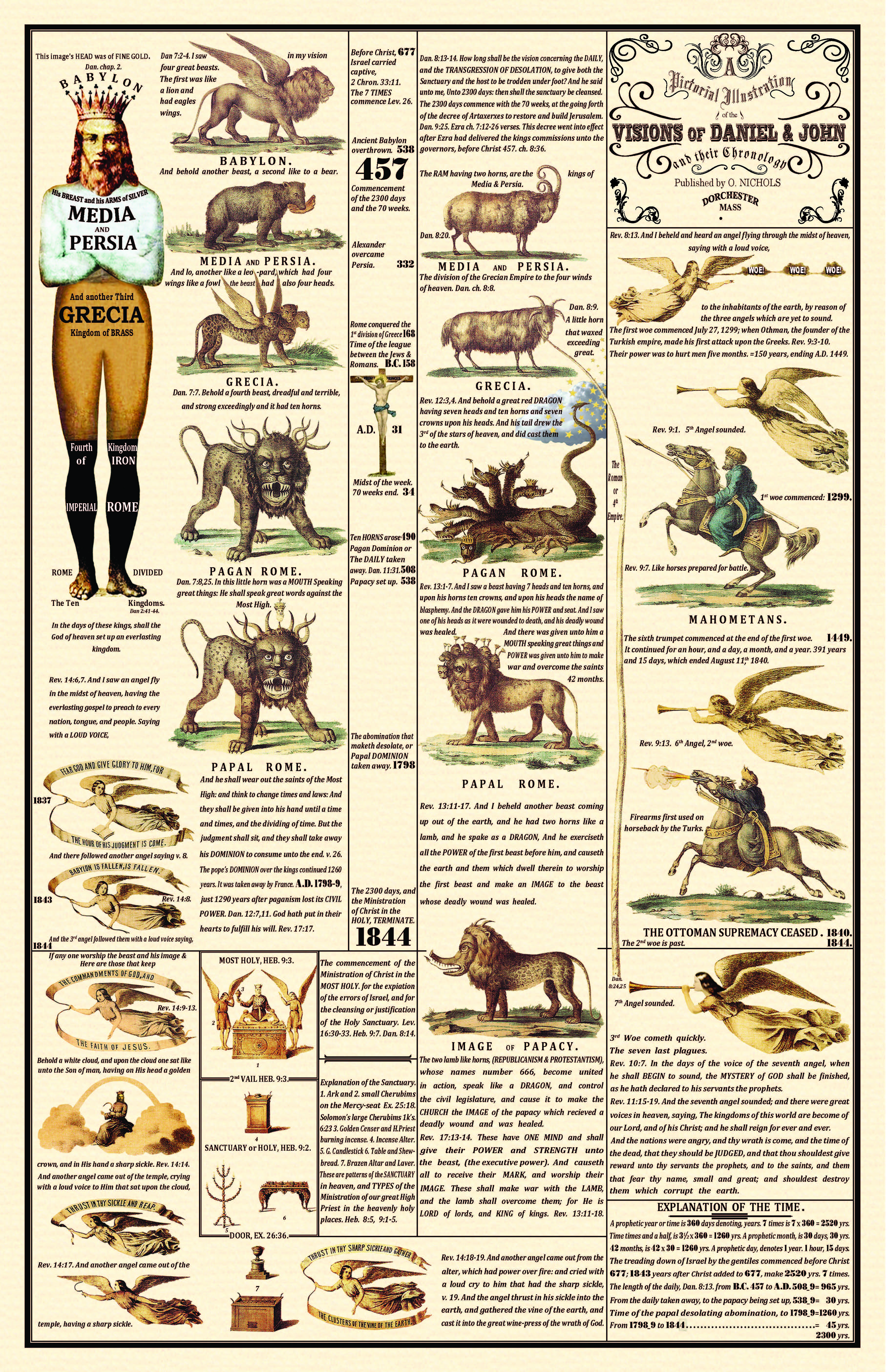
Click Here to Download the '1850 Prophetic Chart' of Habbakuk 2:3 in PDF Format Now "And the LORD answered me, and said, Write the vision, and make it plain upon tables, that he may run that readeth it. For the vision is yet for an appointed time, but at the end it shall speak, and not lie: though it tarry, wait for it; because it will surely come, it will not tarry. Behold, his soul which is lifted up is not upright in him: but the just shall live by his faith.”
Click Here to Download '1850 Prophetic Chart Key of Explanation' in PDF Format Now 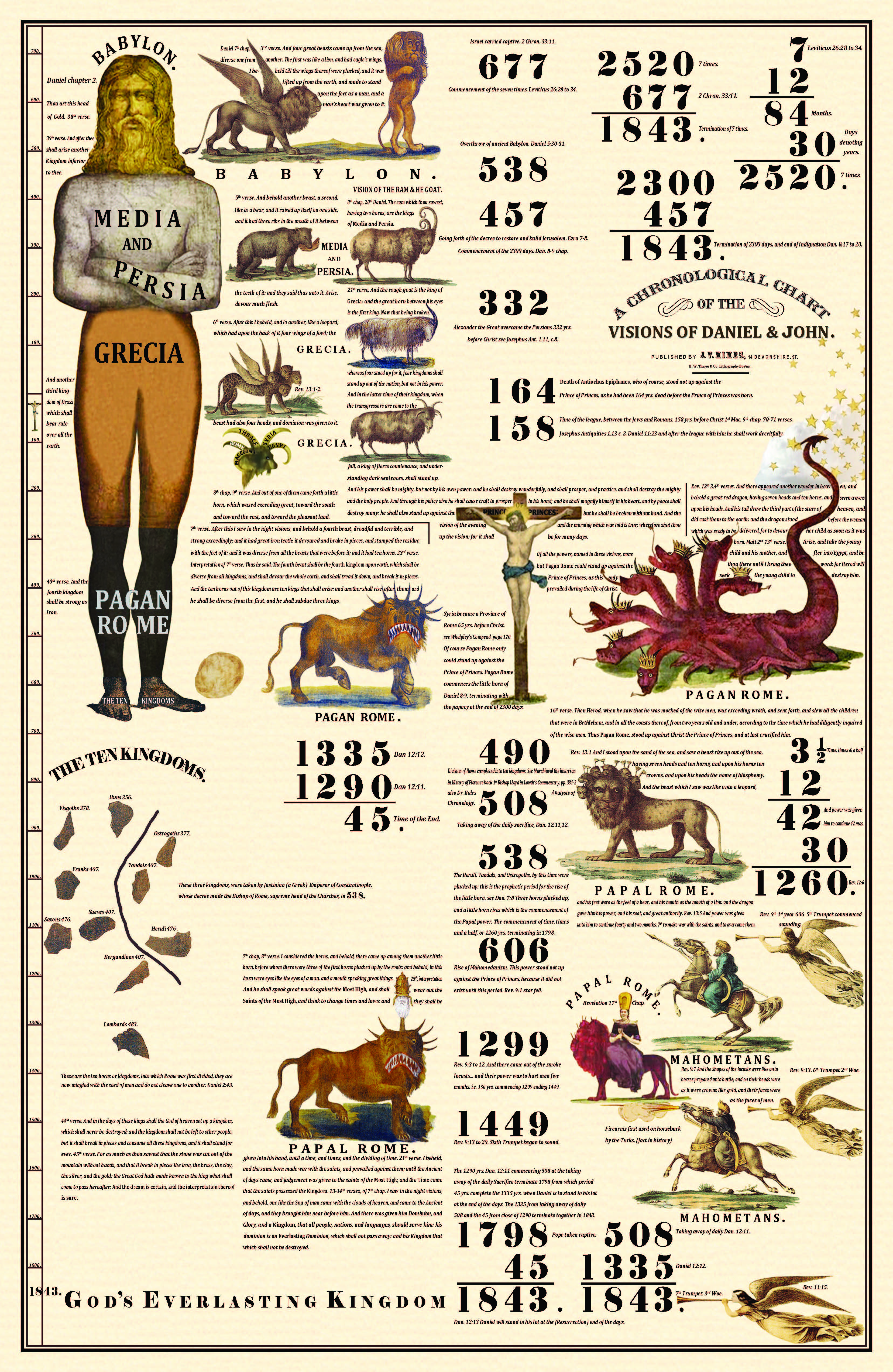
Click Here to Download '1843 Prophetic Chart' in PDF Format Now
Click Here to Download '1843 Prophetic Chart Key of Explaination' in PDF Format Now 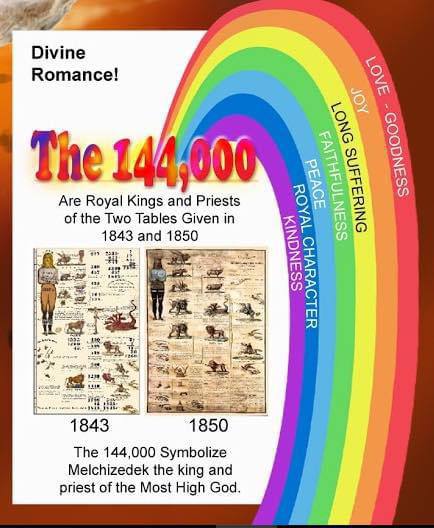
Click Here to Download '1843 & 1850 Rainbow of 144,000 Character Chart' in PDF Format Now 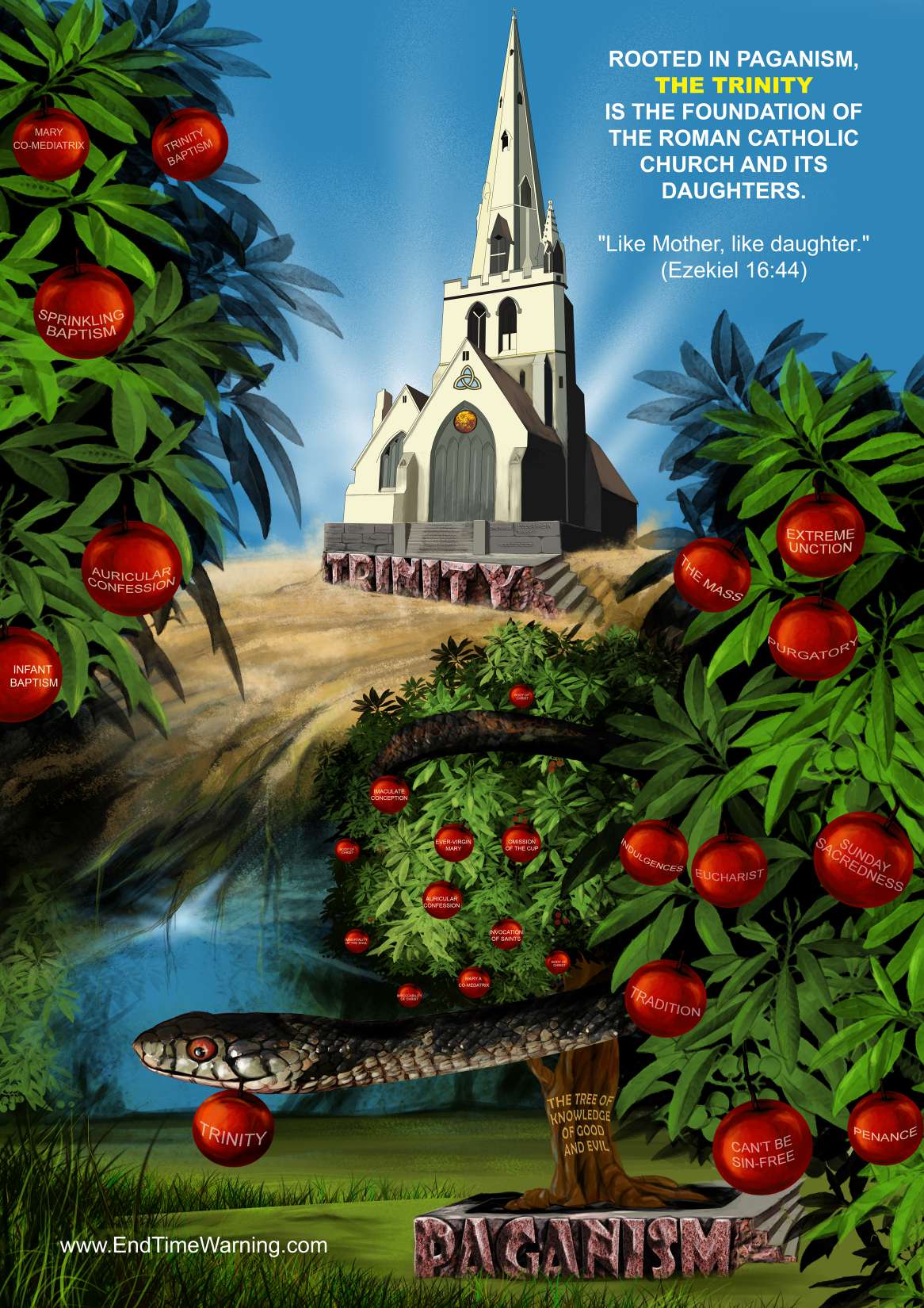
Click Here to Download 'Trinity Tree Poster' in PDF Format Now 